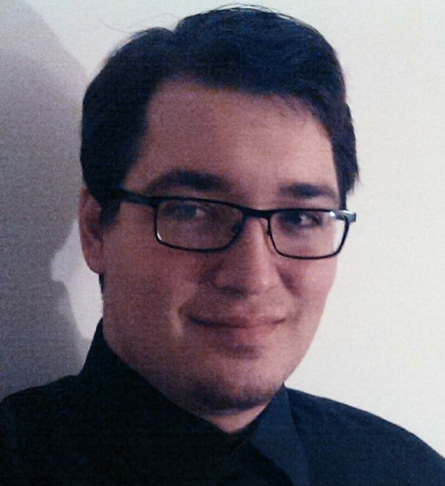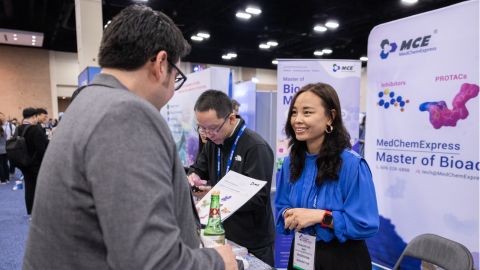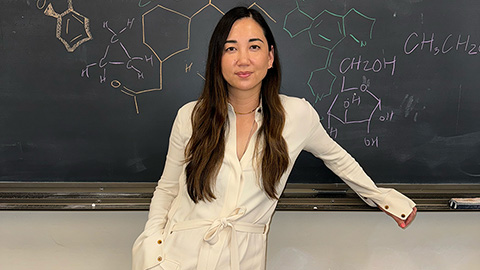‘It’s taken a lot of moves and reevaluations’
Accuracy is vital in pharmaceutical manufacturing — so much so that the reagents used to test new products must themselves be tested regularly. Donald Conover works in quality control at a Merck plant that manufactures vaccines. He talked to ASBMB Today about the strict regulatory environment and his experience trying a series of jobs before he landed where he is now. This interview has been edited.

Name: Donald Conover
Current position: Quality control specialist, Merck
Career path: B.S., molecular biology, University of Prince Edward Island
First job outside of academia: Consultant scientist, Aerotek (a staffing agency)
Favorite molecule or protein: Titin. It’s the largest known protein, with the human version containing about 34,000 amino acids.
What does it mean to work in quality control at a vaccine manufacturing plant?
I work with a very specific part of quality control, on the critical reagents that are used to release vaccine products to the global market. Release testing uses set standards and known quantities to test against; we maintain those materials.
My part of the group monitors 27 different reagents. We’re responsible for understanding how these materials are used and the best way to maintain them and qualifying new lots. My standard day is a lot of reading and writing reports and interpreting data from our testing labs. We also work with the regulatory filing group all the time.
How did you get involved in this kind of work?
I started working with Merck through a different group, under a temporary contract. Then I went to an oncology research company — but I really didn’t like research. I found out I like the structure of a GMP (good manufacturing practice) environment. In a GMP space, you’re following the rules and guidelines; you have to have written procedures and protocols, and you have to receive certain trainings before you do anything.
The research position I was in didn’t have a lot of that. I would be asked to do a flow cytometry experiment, but that wasn’t anything that I had extensive practice in. I found it very difficult to get my staining correct, or to handle the cells, because there wasn’t that training procedure. They gave me ample chances to succeed, and I can honestly say I tried my hardest, but it was just not a good fit.
So when Merck reached out to me and said, “Hey, we have an open full-time position in our group again — would you like to come back?” I was like, “Yes!”
Tell me about the training requirements for your job?
You get trained on the job on systems for document retention, for recording laboratory events, reporting test results, basically everything. You’re trained how to properly review a document and check for errors. Then there are annual refresher courses and retraining any time one of the procedures gets updated. There’s a whole group dedicated just to managing the trainings.
I’ve read recently about labor shortages in biotech and biomanufacturing. Have you experienced that?
What I’ve seen is more the use of temporary or contract workers instead of full-time positions. One of the people I work with, the lead for one of our franchises, is on a contract. If she leaves or her contract expires and isn’t renewed, it’ll take somebody four or five months to pick up. When I was with my current group the first time, as a contractor, I had knowledge of the franchises I was working on; then I left, and it fell to somebody else who was less experienced to figure out what was going on.
What’s your next step?
That’s a hard question. I like what I do and the people I work with. I might prefer a more lab-based role, but at the same time, being in this role (this year) has been an absolute blessing — when I’m working from home, my daughter stays with me. Something Merck supports is broadening your experience by trying out different departments. I might do that.
A lot of my career has been like, “All right, what’s my next step?” In the last 10 years, the longest I’ve stayed in one position was three years. Sometimes another opportunity came along. In one job, I loved the work, but driving four hours a day in Philly traffic was just too much — I was missing too many things with my daughter. I learned that work–life balance is very important to me.
It’s taken a lot of moves and reevaluations of where I was before I finally got to this job. I think that’s becoming more and more common.
(Would you like to suggest an ASBMB member who works in industry for a Five Questions interview? Send an email to ASBMB Today.)
Enjoy reading ASBMB Today?
Become a member to receive the print edition four times a year and the digital edition monthly.
Learn moreFeatured jobs
from the ASBMB career center
Get the latest from ASBMB Today
Enter your email address, and we’ll send you a weekly email with recent articles, interviews and more.
Latest in Industry
Industry highlights or most popular articles

How Alixorexton could transform narcolepsy treatment
A new investigational drug, alixorexton, targets the brain’s orexin system to restore wakefulness in people with narcolepsy type 1. Alkermes chemist Brian Raymer shares how molecular modeling turned a lab idea into a promising phase 3 therapy.

Inside industry postdocs
As more Ph.D. scientists look beyond academia, industry postdocs offer a new kind of training, where mentorship meets mission-driven research. Fellows at Pfizer and Genentech share how these programs prepare them to translate discovery into impact.

Black excellence in biotech: Shaping the future of an industry
This Black History Month, we highlight the impact of DEI initiatives, trailblazing scientists and industry leaders working to create a more inclusive and scientific community. Discover how you can be part of the movement.

Attend ASBMB’s career and education fair
Attending the ASBMB career and education fair is a great way to explore new opportunities, make valuable connections and gain insights into potential career paths.

Benefits of attending a large scientific conference
Researchers have a lot of choices when it comes to conferences and symposia. A large conference like the ASBMB Annual Meeting offers myriad opportunities, such as poster sessions, top research talks, social events, workshops, vendor booths and more.

Biotech startup worms its way into therapeutics
Andrea Choe's company, Holoclara, has created an anti-inflammatory drug based on a molecule from worms.

